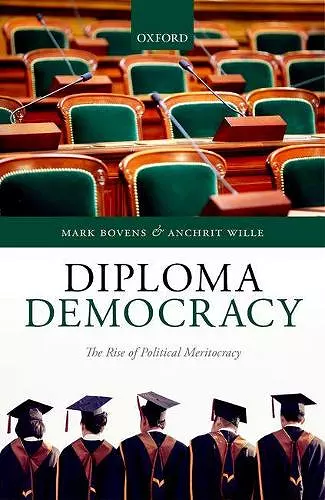Diploma Democracy
The Rise of Political Meritocracy
Mark Bovens author Anchrit Wille author
Format:Hardback
Publisher:Oxford University Press
Published:29th Jun '17
Currently unavailable, and unfortunately no date known when it will be back

Lay politics lies at the heart of democracy. Political offices are the only offices for which no formal qualifications are required. Contemporary political practices are diametrically opposed to this constitutional ideal. Most democracies in Western Europe are diploma democracies - ruled by those with the highest formal qualifications. Citizens with low or medium educational qualifications currently make up about 70 percent of the electorates, yet they have become virtually absent from almost all political arenas. University graduates have come to dominate all political institutions and venues, from political parties, parliaments and cabinets, to organised interests, deliberative settings, and Internet consultations. This rise of a political meritocracy is part of larger trend. In the information society, educational background, like class or religion, is an important source of social and political divides. Those who are well educated tend to be cosmopolitans, whereas the lesser educated citizens are more likely to be nationalists. This book documents the context, contours, and consequences of this rise of a political meritocracy. It explores the domination of higher educated citizens in political participation, civil society, and political office in Western Europe. It discusses the consequences of this rise of a political meritocracy, such as descriptive deficits, policy incongruences, biased standards, and cynicism and distrust. Also, it looks at ways to remedy, or at least mitigate, some of the negative effects of diploma democracy.
A fascinating book by Mark Bovens and Anchrit Wille, Diploma Democracy, shows that what they call political meritocracy is advancing across the rich world. * The Economist *
This book is accessible and engaging with chapters often opening with humorous anecdotes. There are a lot of helpful graphs and tables and one does not need a PhD in maths to follow them. Its recommendations aside, this is a convincing book. It fulfils its explicit purposes and, I think, is good for undergraduate and graduate students in primarily English-speaking countries to learn about how and why politics, society and education are markedly different in some of the countries of Western Europe. * Jameel Hampton, London School of Economics and Political Science *
For all those who marvel how blue-collar workers from the rustbelt have come to vote for Donald Trump, this very well written, highly accessible text should come as an eye opener. Based on cutting edge social science research it not only shows how the citizens in the most advanced democracies are increasingly divided on the basis of education. It also documents that their democratically chosen representatives are almost exclusively recruited among the highly educated and exceptionally responsive to them. No wonder do the less educated feel left out. No wonder do they follow the sirens of populist leaders who speak their language and claim to give them a voice. This is a powerful statement that should be taken extremely seriously by politicians and political observers across Europe and the United States. * Hanspeter Kriesi, Stein Rokkan Chair for Comparative Politics, European University Institute, Florence *
ISBN: 9780198790631
Dimensions: 241mm x 160mm x 23mm
Weight: 544g
248 pages